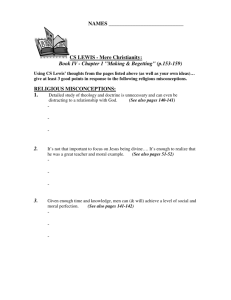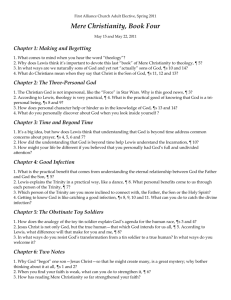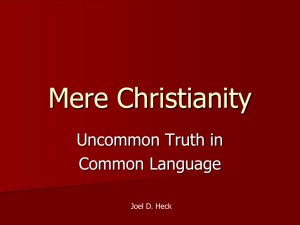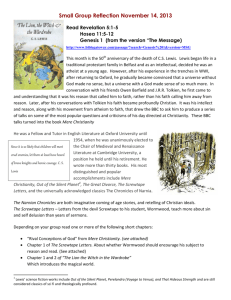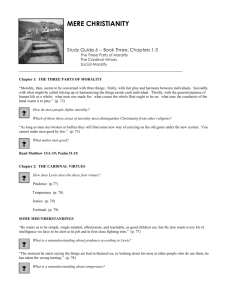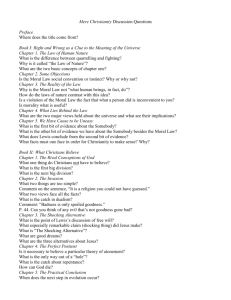Mere Christianity
advertisement
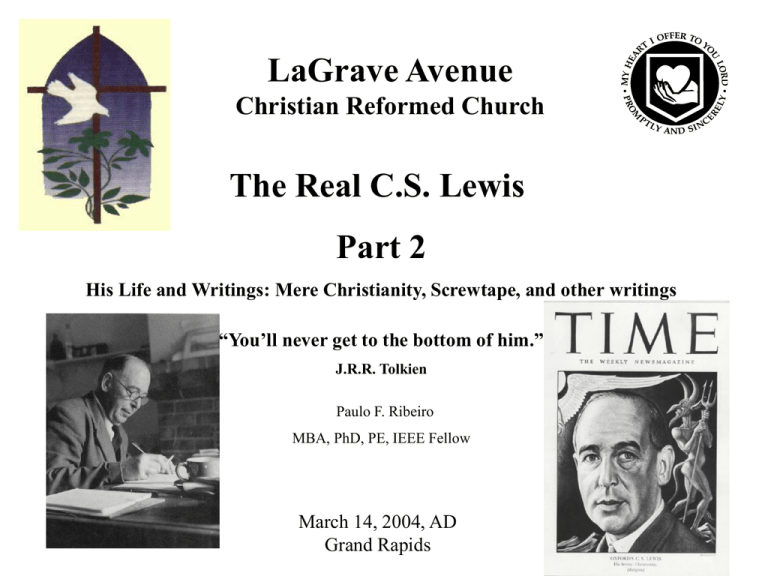
LaGrave Avenue Christian Reformed Church The Real C.S. Lewis Part 2 His Life and Writings: Mere Christianity, Screwtape, and other writings “You’ll never get to the bottom of him.” J.R.R. Tolkien Paulo F. Ribeiro MBA, PhD, PE, IEEE Fellow March 14, 2004, AD Grand Rapids Introductory Words Born in Belfast in 1898. Educated in England (prep school then at Malvern College and finally by a private tutor. Enlisted in the army in 1917, saw front-line combat and was Wounded in France. Returned to his studies after the war, graduated in 1922 and became a fellow of Magdalen college in 1925. An atheist in his boyhood, Lewis converted to Christianity in 1931 and became famous as a result of his wartime religious talks on the BBC, and his children's books. Lewis was part of the Oxford literary circle known as the Inklings, whose members also included J.R.R. Tolkien and Charles Williams. Married Joy Davidman Gresham in 1957, an American with whom he had corresponded for a number of years. Died on November the 22nd 1963, the same day that John F. Kennedy was assassinated in Dallas. The Many Sides of Lewis: Lewis, the distinguished Oxford literary scholar and critic; Lewis, the highly acclaimed author of science fiction and children's literature; Lewis, the popular writer and broadcaster of Christian apologetics, the Knight of Orthodox Christianity (Champion of Mere Christianity); Lewis, the soldier and faithful friend (from Arthur Grieves to Tolkien) Lewis, the masterful teacher and tutor; Lewis, the private man and with family problems (Father, Warren, Mrs. Moore) Lewis, the romantic yet rationalist (Baptized imagination) Lewis, the thoroughly converted man (The Pilgrim’s Regress) Lewis, surprised by marriage (the “Joy” of his life) Lewis, the aggressive debater and humble/gentle man Mere Christianity Book I: Right and Wrong as a Clue to the Meaning of the Universe I. The Law of Nature II. Some Objections III. The Reality of the Law IV. What Lies Behind the Law V. We Have Cause to be Uneasy Book II: What Christians Believe I. The Rival Conceptions of God II. The Invasion III. The Shocking Alternative IV. The Perfect Penitent V. The Practical Conclusion Mere Christianity Book III: Christian Behavior I. The Three Parts of Morality II. The "Cardinal Virtues" III. Social Morality IV. Morality and Psychoanalysis V. Sexual Morality VI. Christian Marriage Book IV: Beyond Personality or First VII. Forgiveness Steps in the Doctrine of the Trinity VIII. The Great Sin I. Making and Begetting IX. Charity II. The Three-Personal God X. Hope III. Time and Beyond Time XI. Faith XII. Faith, level II IV. Good Infection Book I: Right and Wrong as a Clue to the Meaning of the Universe II. Some Objections Lewis sites two objections to his theory of natural law which have come to him through letters from readers (The law is from instinct or social convention) III. The Reality of the Law Lewis concludes that the moral law (or natural law) is alive and active in human lives. "Men ought to behave decently in order to benefit society", is a redundant statement. Book I: IV. What Lies Behind the Law Science cannot be used to discover the mind behind the creation of the universe. V. We Have Cause to be Uneasy Lewis gives three reasons to consider religion as a means to satisfy the guilt imposed by the moral law. 1. Lewis suggests that one reason to reconsider religion is that humanity is on the wrong road. Do you think humanity is still on the wrong road? 2. Lewis states that if God is like the moral law, he is not soft or sentimental. Why is this shocking? What else points to the existence of God apart from the moral law? 3. According to Lewis, Christianity will not make sense to anyone until they realize...? Mere Christianity Right and Wrong as a Clue to the Meaning of the Universe I. The Law of Nature C. S. Lewis makes note of a tendency in humans of appealing to a standard of absolute truth in quarrels and arguments. He calls this standard the Law of Nature or the Moral Law. • We have heard people quarrelling. • They say things like this: – How'd you like it if ….? – That's my seat I was in it first. – Give me a bit of your chocolate, I gave you some of mine. – Come on you promised. Mere Christianity • The person who says these things is not just saying that he doesn't like the behaviour - rather he is appealing to a higher standard which he expects the other person to know about. • The other person seldom replies: `I don't believe in fairness, or kindness or keeping promises.' `I don't believe in standards of behaviour'. • He will try to say that there is some special reason why he did what he did. • There is another reason why he should have taken the seat, • Things were quite different when he was given the chocolate, • Something else has turned up to stop him keeping the promise. Mere Christianity • Quarrelling shows that we try to demonstrate that the other person is in the wrong. He has offended against what is right. • So some say that everyone instinctively recognises there is a difference between right and wrong and does not need to be taught its basic principles such as fairness, honesty, kindness, courage etc. – (They do not mean that there are not some people who are completely oblivious to the difference - after all some people are colour blind and can’t tell green from blue.) • Others reply and ask: What about the differences between cultures? – However in no culture do people regard kindness as evil, or double crossing people who have been kind to one as good, or cowardice as good. Mere Christianity • There have been, and are, moral differences between cultures - but the differences are not about whether kindness, fairness, generosity, honesty etc are good or evil, but – how these should be applied and – whether they should be applied to all or just to a privileged group. Mere Christianity Where did this moral sense come from? The Moral Imperative pressing upon humanity. • (1) Either it comes from physical world: – (a) Our sense of right and wrong is an instinct that has come from our biological make up or psychology - which are the results of random evolutionary processes. – (b) Our sense of right and wrong comes from social conventions we have learnt. – (c) A combination of (a) and (b) • (2) Or it comes from beyond the physical world – Spiritual world or God. • Even if (1) above is part of the story, can it be the whole story? Mere Christianity Can either of the explanations from the physical world be right? • Consider the first. – Our psychology - result of random evolutionary processes - has led us to value kindness and selflessness.. • But if the sense of goodness is just an instinct which is the result of `survival of fittest' then does it have any intrinsic value? Mere Christianity Is morality only the instinct to preserve the species? • If we hear of someone in danger there will be two contradictory instincts: – Herd instinct to help him - preserve the species. – The instinct to avoid danger - preserve the species. • We will also feel inside us a third thing which tells us we ought to suppress one instinct and encourage the other. • There are appropriate times for each instinct. • Morality tells us that at this time, such and such an instinct should be encouraged. • Therefore morality is not itself just a physical instinct. Mere Christianity • Where does our moral sense come from? – Not as we have seen from our biology. • Has it come from social conventions we have learnt? • Do we ever think that one social convention is better than another? (One society may believe in slavery another not.) • Do we think we have progressed - ie got better in our moral customs? • If we do, then we are implicitly acknowledging another greater Real Morality by which we judge one morality or social convention against another. • Universal agreement that fairness, honesty, kindness etc are good and not evil, cannot be a mere world wide social convention because different cultures believed them to be good before they had met one another. Mere Christianity • Suppose two of us had an idea of what New York was like. • Your idea might be truer than mine because there is a real place called New York by which we can compare our ideas. • But if we simply meant `the town I am imagining in my head' then one person's idea would be no more correct than the other person’s ideas. • If there were no such thing as Real Morality - but just what evolution made people think, or just what different cultures had developed themselves - there would be no meaning to the statement that Nazi morality is inferior to any other morality Mere Christianity • A different form of the argument that there must be more to morality than can be explained from the physical world. • Can one derive an `ought' from an `is'? • Science can tell us what is the case, but can it tell us what ought to be the case? – Electrons behave as they do - that is neither morally right nor wrong - it is just the way things are - the whole story. – We behave in certain ways but that is not the whole story for we know we ought to behave in certain other ways. – Therefore there is more than one kind of reality. • The first of these realities is subject to scientific investigation and discovery - the other one isn’t. Mere Christianity • If our moral sense is not mere biology/ psychology nor social convention then: – it must have come from beyond the physical world. • That is what religion is about. Mere Christianity Book I - Right and Wrong as a Clue to the Meaning of the Universe An Engineering Perspective A Flow-Chart Approach Mere Christianity End of the Story Do you believe in the existence of a Moral Law? No Yes What Kind: A Force (Power)? An inconsistent Power End of the Story No Yes No A God ? No A Force/Power is a sort of a tame and convenient God . Is there anything or anyone behind the Moral Law? End of the Story Are you tricking me with a religious talk? Yes No We are trying to find truth and the meaning of the universe. Yes Are you interested? No End of the Story Yes Mere Christianity How can we find out more about the thing behind the moral law and the meaning of the universe? Looking into the The Universe He Made He is a great artist But you cannot know a man by looking at the house he built. Looking inside ourselves, where He wrote the moral laws He is quite merciless. The universe is a very dangerous place. End of the Story The Moral Law ells you to do the straight thing and it does not seem to care how painful, or dangerous, or difficult it is to do. The Moral Law does not give us any grounds for thinking that God is “good” in the sense of being soft and nice.. The Moral Law is as hard as nails. If God is like the Moral Law, then HE IS NOT SOFT. No Do you want to proceed? at your own risk? End of the Story Yes End of the Story Mere Christianity Is He an Impersonal Absolute Goodness ? No Is He a Personal absolute Goodness ? If the universe is not governed by an absolute goodness, then all our efforts are in the long run hopeless. Yes Absolute Goodness is either the great safety or the great danger - according to the way you react to it. God is the only comfort and supreme terror No exceptions, or allowances permitted. End of the Story No End of the Story Yes Have you broken the Moral Law? Do you think you need Forgiveness? Yes Yes Do you want to find out more about God No End of the Story Christianity tells how the demands of the Moral Law, which we cannot meet, have been met on our behalf, how God Himself becomes man to save man from the disapproval of God. Beginning of Chapter 1 of the Great Story ... Which goes on forever: in which every chapter is better than the one before. Mere Christianity “My reason for going around in this way was that Christianity simply does not make sense until you have faced the sort of facts I have been describing. Christianity tells people to repent and promises them forgiveness. It therefore has nothing (as far as I know) to say to people who do not know they have done anything to repent of and who do not feel they need any forgiveness. It is after you have realized that there is a Moral Law, the Power behind the law, and that you have broken that law and put yourself wrong with the Power - it is after all this, and not a moment sooner, that Christianity begins to talk. Mere Christianity The Christian religion is, in the long run, a thing of unspeakable comfort. But it does not begin with comfort; it begins with dismay. In religion, as in war and everything else, comfort is the one thing you cannot get by looking for it. If you look for truth, you may find comfort in the end. If you look for comfort you will not get either comfort or truth - only soap and wishful thinking to begin with and, in the end despair. All I am doing is to ask people to face the facts - to understand the questions which Christianity claims to answer.” The Rival Conceptions of God I. Those who believe in some kind of God - majority 1. God is beyond good and evil b/c of our human point of view a. everything good in one way, bad in another b. Pantheism (Prussian philosopher Hegel and Hindus) c. God animates the universe and he IS the universe – if he did not exist the universe would not exist 2. God is good and wants us to behave in one way and not another a. Jews, Mohammedans, and Christians b. Christian idea: God invented and made the universe c. Example: painter/painting can be destroyed/painter still exists/in the painting you can see the painter d. Must believe that God is separate from the world and that some things are contrary to his will e. Thinks that a great many things have gone wrong and God insists upon our putting them right again (wants it right, not wrong – defined by Bible) II. Those who do not believe in any kind of God – minority 1. 2. Argues against God by saying God is unjust A man does not call a line crooked unless he has some idea of a straight line – what was Lewis comparing justice with? a. Lewis decides that justice is not just his private feelings, but that there is a need for justice from a creator b. Concludes: if the universe has no meaning, then we should never have found out that it has no meaning (used example of if we were always in darkness, we would not know what light is) Mere Christianity Book 2 - What Christians Believe Who was (and is) Christ? Lunatic? God? It does Not Make Sense It is beyond my senses Great Moral Teacher? It is non-sense Mere Christianity Book 2 - What Christians Believe The Cosmic Equations - Calculus for Life ( 0) God (Universe) Creation (Universe)dx. dy. dz (Good ) ( God ' s... Will ) ( Evil ) Fall d ( Evil ) ( Sin) dt ( Man' s... Sins) ( Death) ( Jesus' ... Suffering...& ... Re surrection) ( Death) Redemption ( Death) ( Eternal... Life) Mere Christianity The C.S. Lewis Catechism Q1. Why does man need God? A1. Because God made man to run on God Himself Q2. Why did God give free will to man allowing evil to come into the picture? A2. Because free will is the only thing that makes possibly any love or goodness or joy worth having. Q3. What did God do to restore / redeem man? A3. God Himself becomes man to save man from the disapproval of God. Q4. What is formula of Christianity? A4. That Christ was killed for us, that His death washed out our sins, and that by dying He disabled death itself. That is the formula. That is Christianity. That is what has to be believed. Q1 - says in a less elegant way what Augustine said 1500 years ago. "Though hast created us for Thyself and our hearts are restless until they find their rest in you." Q2 - Lewis leaned more to the semi-pelagian or Arminian side of things on free will than he did of the classiscal reformers (e.g. Luther, Zwingli, Calvin). They all would agree on free will before he Fall, but Lewis held to the idea of free will after the Fall. Re point three, he seems to operate with the Anselmina view of the atonement, which is held to by Calvinists, Lutherans, and most evangelicals. Mere Christianity The C.S. Lewis Catechism Q5. Is salvation by God's predestination or by human choice? A4. "I was offered what now appears a moment of wholly free choice. But I feel my decision was not so important. I was the object rather than the subject in this affair. I was decided upon... I chose, yet it really did not seem possible to do the opposite." Mere Christianity "Faith... is the art of holding onto things your reason has once accepted, in spite of your changing moods. For moods will change, whatever view your reason takes. I know that by experience. Now that I am a Christian, I do have moods in which the whole thing looks very improbable: but when I was an atheist, I had moods in which Christianity looked terribly probable. This rebellion of your moods against your real self is going to come anyway. That is why Faith is such a necessary virtue: unless you teach your moods 'where they get off,' you can never be either a sound Christian or even a sound atheist, but just a creature dithering to and fro, with its beliefs really dependent on the weather and the state of its digestion." "... As St. Paul points out, Christ never meant that we were to remain children in intelligence: on the contrary, He told us to be not only 'as harmless as doves' but also 'as wise as serpents.' He wants a child's heart, but a grown-up's head." He took in more, he felt more, he remember more, he invented more … His writings record an intense awareness, a vigorous reaction, a taking of the world into his heart … His blacks and whites of good and evil and his ecstasies and miseries were the tokens of a capacity for experience beyond our scope. Austin Farrer on C.S. Lewis Conclusion It is the way Lewis thoroughly integrated his Christian faith into his scholarly work that leaves the largest legacy and which has impressed me and blessed me most. Lewis taught me... how to long for God and seek true joy. How to integrate a Christian worldview with my vocation, my family life, and my inner self. If go to Lewis for ultimate answers you will be disappointed. In all his writings, Lewis tried to point to Christ. The impact of Lewis on my life has been great. He has challenged me to grow in my faith so that I’m not afraid to engage spiritually and intellectually with a world hostile to God. But above all he has taught me that the power of the imagination is one of the greatest tool we have to bridge the gap into the secular mind. My tropical-Latin-culture- mind found in Lewis a way to conciliate samba, soccer, engineering, theology, joy … which is consistent with a Reformed worldview. Next Weeks • March 21 – Myth, Imagination – Narnia and Trilogy • March 28 – Love, Pain and Suffering – Shadowlands
